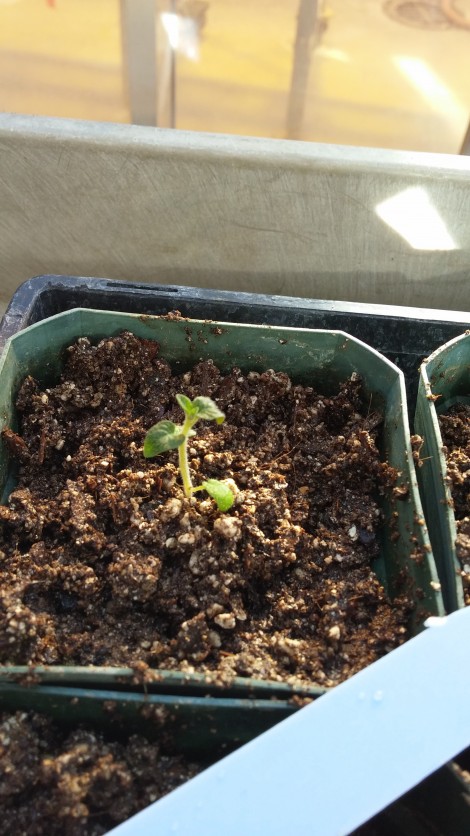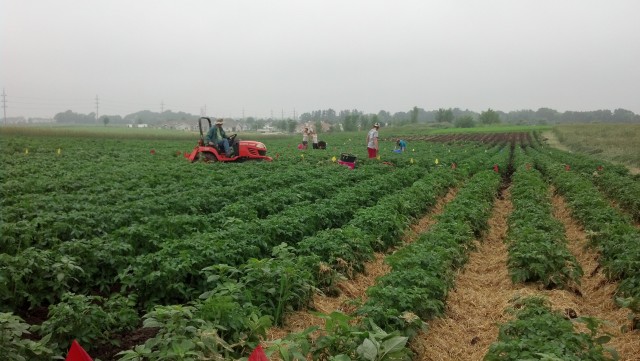Breeding, seed potatoes and weeds, oh my! On-farm research opportunities in 2015.
A truly sustainable food system uses locally adapted crop varieties and can produce seed for the next crop. In working towards sustainable organic potato production, our goal is to help build a farmer-led system for breeding and seed production of potato varieties that are suited to organic production. We’re in the Midwest, so this is where we focus our efforts – but I hope that what we learn will be useful in other places too. Many places across the world, including some of the poorest, need breeding and seed production focused on their growing environment, so that they can have true food security. In a changing climate, this is more important than ever. Even in the birthplace of potatoes, climate change is affecting variety choices.
This year we are starting some projects that will help farmers get into the nitty-gritty of breeding and seed production, and I am really excited about it! We’re also continuing our variety trialing project with some new varieties added to the mix this year. And we’re looking for farms to trial the weed management practices we’ve been testing in our fieldwork to see how practical straw mulching is on a field scale.
First, the breeding project! In any breeding work, selection of parents is a critical step. In our previous variety trials, we identified varieties that were hardy, coped well with pests and diseases, and yielded reliably. We did some crossing studies – since not all potato varieties are fertile – and figured out which varieties were compatible. We have 19 good parents to choose from – with a wide range of colors and shapes! Participating farmers will choose the parents they want to work with, and we’ll send out tubers as well as a “breeding kit” for pollination and collection of seed – true potato seed (TPS) not tubers! Crossing potatoes is surprisingly easy, and we’ll have videos as well as written instructions to help.
For those who may lack the time to make crosses and collect seed, we can provide TPS this year from crosses we have already made. Some of these are already in our greenhouse, with many more to follow:

Potato seedlings are raised much like tomato seedlings, and can be transplanted to the field in a similar way – though because they are generally a little less vigorous to start, it’s wise to start them early. Since progeny of potato crosses are highly variable, there should be some weird and wonderful potatoes to be seen – and among them, hopefully some winners! The best lines will be evaluated more widely in variety trials on farms around the Midwest, allowing us to compare them to known varieties.
Speaking of variety trials… those will be continuing this year. We have over 60 heirloom and specialty varieties to trial this year, including many from Seed Savers Exchange, and some breeding lines from our crosses. I will put up a list with photos and descriptions in the coming weeks, and participating farmers/gardeners can choose those of interest to them. As before, we’ll provide 10 seedpieces per variety, and ask that participants also grow check varieties for each potato type (eg red, yellow) and three plots of a standard variety that will be grown on all participating farms. We’ll provide guidance on variety evaluation – and since participants will keep the tubers, we’ll include guidance on taste evaluation – very important!
The next step is seed production – because once we’ve chosen those great varieties, we need a way to produce healthy seed potatoes. Seed potatoes can be infected with viruses and other pathogens, so seed potato growers manage their crops carefully to minimize disease, and have them tested and certified for freedom from pathogens. We need more organic growers of certified seed potatoes! We’re partnering with several farms this year to trial seed production from minitubers – the small, pathogen-free tubers produced in greenhouses from tissue cultured plants. Minitubers, when planted in the field, will produce normal sized tubers. We’ve previously tested management strategies to minimize virus spread, and will work with participating farmers to help them choose the most appropriate methods for their farm. In this and future years, we’ll analyse the real world farm economics of seed potato production versus buying certified seed potatoes.
Finally, weed management – which isn’t directly related to variety choice and seed production, but is a challenging issue in organic potato production. We started researching weed management since we realized that if we didn’t get on top of this in our own research plots, we wouldn’t be able to answer our other research questions! Straw mulching has been very successful for us, compared to mechanical weed management (tine weeding and hilling). However, we’d like to see how this works out on organic farms with different scales of potato production. This year, farmer partners will apply straw mulch to small plots within their larger potato fields, observe the weed pressure in those plots and the larger field, and check for an effect on yield. We’ve seen yield increases in straw-mulched plots, especially in drought years. If large enough, this could nicely offset the cost of applying straw mulch.

One of the most enjoyable aspects of this work is getting to know the farmers who participate in on-farm trials. I’m delighted that many of you will be joining us for yet another year! If you have not participated in the past and are interested in trying some on-farm research, you are very welcome to contact me to see how you can get involved.
Till next week – stay warm!
Ruth
This article was posted in Blog Posts, Opportunities, Research News and tagged certified seed potatoes, organic, potato breeding, potato variety trials, Seed Savers Exchange, straw mulch.